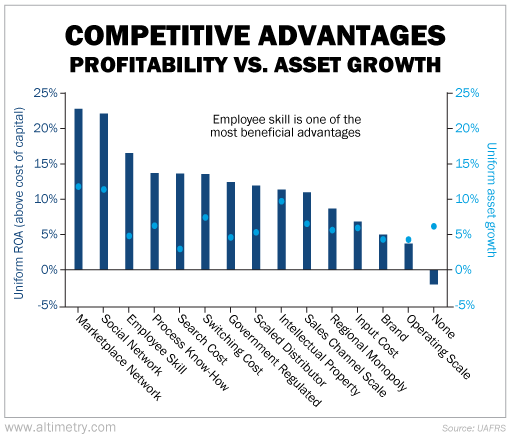 The top CEO training grounds are no longer factories...
The top CEO training grounds are no longer factories...
For most of the 20th century, America's top executives came out of the same few institutions. General Electric (GE), IBM (IBM), and Procter & Gamble (PG) were both blue-chip brands and talent machines.
Alumni from these businesses fanned out across corporate America. They brought with them a rigorous, operations-first playbook.
But those days are behind us. A new crop of corporations now dominates the list of prior employers for freshly appointed CEOs.
From 2020 to 2024, consulting firms rose to the top. Companies like McKinsey and Accenture (ACN) now provide the bulk of eventual C-suite employees.
This is the first time consultants have claimed this spot since leadership researchers began tracking this data. The prize used to go to manufacturers or tech firms instead.
Folks, this trend is more than a shift in CEO origins.
It's a clear sign that executive-leadership priorities are changing on a fundamental level.
 CEOs are being chosen for problem-solving rather than operational skills...
CEOs are being chosen for problem-solving rather than operational skills...
Folks used to climb the ranks by running big divisions.
That type of experience still matters... but it's no longer top priority.
The modern C-suite needs more than operators. It needs integrators who can navigate challenges and disruptions.
In that world, consultants offer a different kind of edge.
Accenture is a great case study. The consulting giant pours more than $1 billion a year into workforce development.
It puts its employees through rotational programs where they get practice working in multiple parts of the business, like strategy and consulting. They often get exposed to clients in multiple sectors.
And its alumni often leave with a tool kit tailor-made for executive leadership.
Consultants like McKinsey, Bain, and Boston Consulting Group offer similar preparation. Their people are trained to introduce creative thinking to help large organizations improve.
That makes them well-suited to lead companies that must grow and change in unpredictable environments.
 Employee skill could become a powerful tool...
Employee skill could become a powerful tool...
This is one area we look at when we talk about "competitive advantage."
There are 14 main types of competitive advantage. Some businesses get ahead by being large enough to produce goods cheaper than their peers. Others rely on brand equity.
Consulting companies in particular build their advantage by hiring and training experts in specific areas... and selling their time to customers.
It's often cheaper for customers to contract these folks for specific projects than to hire them outright. But at the C-suite level, companies will make an exception. They'll hire ex-consultants to help grow their own employee skill advantage.
Take a look at the chart below. It shows competitive advantage data from more than 3,000 publicly traded U.S. companies.
The blue bars reveal how much of a profit boost each advantage grants above the baseline 5% cost of capital. For example, employee skill offers a 16% boost to Uniform return on assets ("ROA").
And the light-blue dots show the average Uniform asset growth for companies with each advantage.
As you can see, not all competitive advantages are created equal. Companies with the employee-skill advantage come in third place for profitability...

The only two advantages with higher returns are "network" businesses. Think eBay (EBAY), a buying and selling network, or social network Meta Platforms (META).
Not every business can be a network... but they can all benefit from employee skill.
That's why companies are now prioritizing CEOs who can sharpen skill throughout their organization.
 The right kind of knowledge is a lasting edge...
The right kind of knowledge is a lasting edge...
Investors love intangible assets like brand and intellectual property. They're easy to understand and offer a clear competitive moat, even if it's only for a short time.
But organizational knowhow and employee skill may be some of the most underappreciated drivers of long-term performance.
Companies that invest in their people perform better than just about every other kind of business. It's all about making sure employees get learning opportunities... so they can become experts at what they do.
That's why businesses across all kinds of industries are pushing for at least one former consultant in the C-suite. They're the ultimate employee skill experts.
A switch like this may not make the front page. But it could lead to a slow, steady improvement in performance.
Regards,
Joel Litman
July 23, 2025



 The top CEO training grounds are no longer factories...
The top CEO training grounds are no longer factories...


